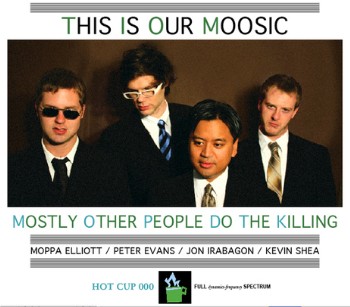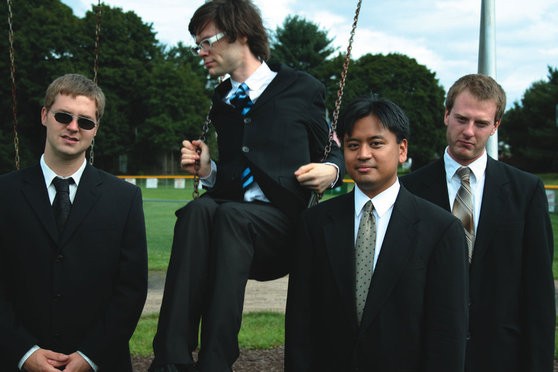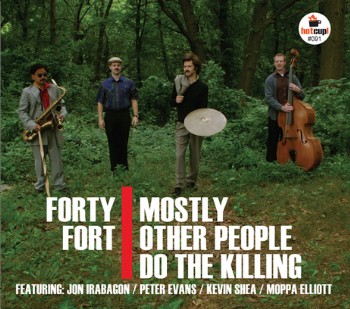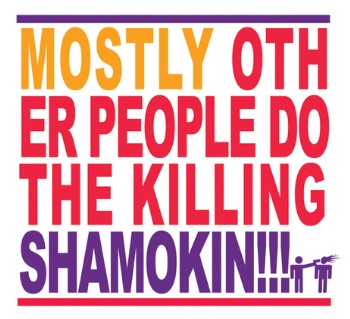Music Review / Commentary: Surprise Packages — Marc Ribot, solo guitar / Mostly Other People Do the Killing
Honesty is Best Policy Disclosure: I was in the hall to hear Mostly Other People Do the Killing. I’d heard the band on CD, and I knew that the only way I could appreciate them fully was to attend a performance.
Marc Ribot, solo guitar / Mostly Other People Do the Killing, at the Barbara Lee Family Foundation Theater at Institute of Contemporary Art, Boston, 9/27.
By Steve Elman
Once again, the Institute of Contemporary Art deserves kudos. For some six years now, the museum has been filling a very significant musical niche in Boston by presenting performers who defy category, people who take their audiences for profoundly idiosyncratic trips. David Henry, the ICA’s Director of Programs, isn’t always rewarded with overflow crowds for these shows, but his programs are never dull.
Not that others in the area aren’t trying—the Lily Pad gallery and performance space in Cambridge often books similarly adventuresome musicians, but when you go there, you’re definitely traveling in steerage. For sightlines, sound system, seating comfort, and general ambience, the ICA’s Barbara Lee Family Foundation Theater gives the avant-garde audience a chance to ride first class, with a spectacular view of the harbor, no less
For months I’ve been anticipating the Ribot/Mostly Other People Do the Killing (MOPDtK) double-bill, since the originally-scheduled date in last year’s season had to be canceled. Both artists deserve long-form appreciations, but in the interest of timeliness (and because both have already been the subject of intelligent and well-written articles), I’ll concentrate on the details of the September 27 show and add some observations prompted by each.
The pairing didn’t provide much cross-illumination, but I was grateful for it nonetheless. I suspect the ICA put the artists together as an economic measure; probably neither of them could have drawn enough people to make two separate concerts viable. Personally, I would gladly have come out for a full evening of music from Mostly Other People Do the Killing, and no doubt there were a number in the audience who feel the same way about Ribot. Because of the tandem billing, I learned a good deal about an artist whom I knew only by reputation, and maybe the Ribot fans were similarly educated about MOPDtK.
Ribot definitely has more cachet, probably owing to his performances with big-name artists like Elvis Costello, Tom Waits, and John Zorn, and as part of the support crew on the Alison Krauss/Robert Plant Raising Sand CD. He is remarkably eclectic; his resume also includes gigs with Wilson Pickett, John Lurie and the Lounge Lizards, McCoy Tyner, first-generation avant-garde bassist Henry Grimes, John Medeski, Norah Jones, and Laurie Anderson. When he’s considered as a solo artist or leader, he’s frequently typed with that unfortunate “downtown” label, which gives little or no guidance to someone who’s never heard him.
I came to this set of solo guitar with no preconceptions, but afterwards I wasn’t surprised to learn that Ribot has written eloquently about the late Derek Bailey. Every once in a while, I had the welcome feeling that I was getting the chance to hear what Bailey must have sounded like in live performance.
For those unfamiliar with Bailey’s name (and they are legion), he was one of the world’s most original guitarists, working in what I like to refer to as the “margins” of the instrument. Instead of playing single-note lines, or chords, or familiar patterns, or tunes, or, frankly, anything mainstream, Bailey created a powerful and mysterious music almost exclusively from sound effects, feedback, non-traditional fingering, choking and damping of the strings, unconventional attack with pick and/or fingers, strokes on the pegboard and body, and huge swathes of ambience which were not exactly silence and not exactly noise. His music was as bracing as a bucket of cold water thrown in your face. Listening to it was a kind of electroshock that momentarily wiped out your memory of anything else.
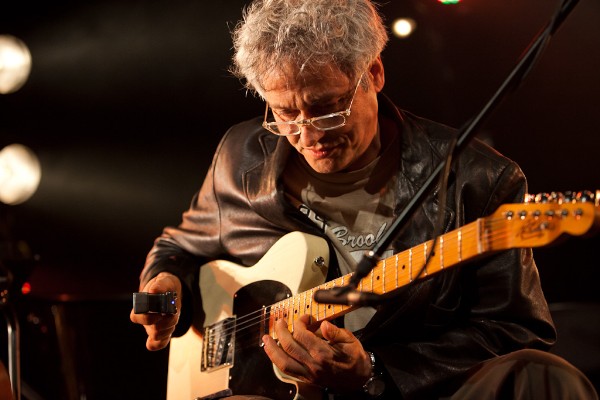
Mark Ribot performs with Doveman at The Studio in Sydney Opera House for Vivid Live 5th June 2010. Photo: Daniel Boud
Ribot’s solo set at the ICA wasn’t quite at that level, and that’s probably for the better. By using Bailey (and Albert Ayler and John Coltrane, among others) as inspirations and foundations, Ribot has invented his own world of sound that stops time in a different way. Recognizable tunes appear, but his improvs from them are not built on chords or thematic kernels. The familiar lines of “I’ve Grown Accustomed to Your Face,” “Smoke Gets in Your Eyes,” “Body and Soul,” “Ain’t Misbehavin’,” and the tunes Ribot announced, Hank Williams’s “Cold Cold Heart” and Ayler’s “Ghosts,” slipped by either fully or partly expressed, juxtaposed with near-flamenco passages, hints of Brazilian rhythm, tiny moments of ballad-feel, a hint of blues changes, jazzy twang a la Barney Kessel, Bailey-style string-damping, a short passage of electronic tremolo, and a remarkable arsenal of attacks on the notes that ranged from soft and fuzzy to brittle and plangent. Only one tune was explored full-on and with single-minded power—the closing exploration of Coltrane’s “Dearly Beloved,” which paid tribute to Coltrane’s passion with long low drones and an ecstatic intensity.
It’s unnecessary and maybe even irrelevant to type Ribot’s performance as “jazz.” It certainly was new music based for the most part on wide-open improvisation. It certainly was worthwhile and satisfying. It drew on jazz without embracing jazz, as if any adherence to genre would limit its horizons. It reminded me of how important it is to leave a space in your head reserved for “Other.”
Honesty is Best Policy Disclosure: I was in the hall to hear Mostly Other People Do the Killing. I’d heard the band on CD, and I knew that the only way I could appreciate them fully was to attend a performance. On the strength of what I heard at the ICA, I think they are superlative, even better than what I perceived from their recordings. If you care about great music, you owe it to yourself to hear them, and someone at Scullers or the Regattabar should book them for a date in 2013 so that you can do so easily. I can tell you this—if I’m in town when they’re here next, I will be in the audience, and you’ll be able to recognize me from the foolish grin on my face.
MOPDtK is a quartet without harmony instrument—two horns, bass, and drums. It grew out of student work at Oberlin College in Ohio, where bassist Moppa Elliott and trumpeter Peter Evans met. They were the original sparkplugs, but saxophonist Jon Irabagon and drummer Kevin Shea are now equal partners, at least in so far as performance is concerned. Conversely, as the group’s live interaction has become more and more intuitive, Elliott has emerged more and more as its music director and principal composer.
The name? It’s a translation of a remark made by Leon Theremin, re Stalin’s purges, as deliberately provocative as is the description of the group as a “bebop terrorist band” from the website of Hot Cup Records, their label. They thumb their nose at traditional marketing—and in fact, one of the reasons I was first intrigued by them was their choice to parody an obscure Roy Haynes LP for the cover art of their release Forty Fort. When I bought the CD, I found it contained an elaborate burlesque of the erudite liner notes I used to hate, supposedly written by one “Leonardo Featherweight.” With attitude like this, I was immediately hooked.
There’s a sophomoric sardonicism to the public image—after all, these guys are from a generation inured to rock band names like Circle Jerks, Butthole Surfers, and Dead Kennedys. But the edge stops there. The group’s music and performances are shot through with a greater good humor. They clearly enjoy playing together, and they revel in their musical strengths. And what matters most—the artistic quality of what they write and play—is stunningly high.
Other writers have pointed to antecedents for their work (see below for a sample), and I agree, especially with the citations of Ornette Coleman’s early quartet. But no one I’ve read mentions the band I think of first when I hear MOPDtK—Charles Mingus’s small group from the mid-’50s to the mid-’60s, and especially the 1960 quartet with Ted Curson, Eric Dolphy, and Mingus’s right-hand man, Dannie Richmond.
Equivalent in musical skills? Check. Complex music built on simple structures? Check. Bassist-composer-leader? Check. Phenomenal energy? Check. Adventurous and ground-breaking? Check. Ability to stop on a dime, do a 180, integrate schmaltz and venom into the same brew? Check. Sense of humor? Check (though MOPDtK’s jokes are jolly rather than bitter).
MOPDtK has one element that Mingus always sought and never quite found—a dependable trumpet player with superhuman chops. Brilliant and soulful as Ted Curson was and still is, he would have been hard pressed in his prime to match Peter Evans’s gifts. On trumpet and piccolo trumpet, it seems like there is nothing Evans can’t do—circular breathing, multiphonic harmony (using voice and horn together to create the illusion of chords), low-note snarls a la Nat Adderley, kissing effects a la Clyde McCoy, crystal-clear articulation worthy of a classical trumpeter, freak stuff worthy of an Ellington soloist.
Not that I mean to slight the other three players. In a way, the front-line balance is the opposite of what was offered by the Mingus quartet. Evans fills the spotlight role that Eric Dolphy did for Mingus, and maybe inevitably, Jon Irabagon is in Evans’s shadow as Ted Curson was in Dolphy’s. But Irabagon provides more than enough excitement, and he has plenty of chops in his own right. He won the Thelonious Monk saxophone competition in 2008. He has a complete command of the tenor (the only instrument I heard at the ICA, though he also plays alto). He knows his circular breathing, and he’s confident with the inside and outside tricks that are necessary to this music. Without Irabagon, MOPDtK would be much, much poorer.
Kevin Shea is as good a drummer for, and as good a rhythm partner to, Moppa Elliott as Dannie Richmond was for and to Mingus, and that is very good indeed. He applies a personal esthetic to the kit without ever being eccentric or showoffy. His solo work sometimes has that falling-down-the-stairs quality that few others achieve—he reminds me at times of Bob Moses, Paul Motian, Joey Baron, and Matt Wilson.
Such great musicians can only achieve their potential and such intricate tunes can only realize their ambitions if the person playing bass is outstanding. Thank God, Moppa Elliott is more than adequate to the task. He has a gorgeous, fat sound reminiscent of Charlie Haden’s or Jimmy Blanton’s, a sure sense of pitch that allows him to double-stop beautifully and lay out the harmonies perfectly and practiced fingers that always seem to hit notes clean and pure. And his leadership seems easy and graceful, which is a great skill in itself.
His compositions are what give MOPDtK its distinctive character. He smiles on the stand almost as much as Earl Hines used to, and this just might be delight at hearing his tunes played so well. Like Mingus’s pieces, they are complicated collections of routines that must be tossed off with panache. Unlike Mingus’s, they try to cover a lot of emotional ground in a short span. If Mingus’s music went deep, Elliott’s goes wide. His tunes call for the players to skip from rhythm to rhythm, jump through musical hoops, shriek and joke and mutter and suddenly converge to toss off a fast unison. The tempos ratchet up and down. It’s the blues for 30 seconds, and then something that sounds like it’s going towards a mambo, and then a sudden right-hand turn into free improv, and then a reversion to something hoary like a set of eight-bar exchanges between trumpet and sax.
These tunes are devices of pure music but no less joyous for that. Elliott claims to have no extra-musical programs in mind except those suggested by the tune titles, which are all drawn from the odder monikers of communities in his native Pennsylvania. At the ICA, the band played “Pen Argyl,” “Blue Ball,” “Little Hope,” and “St. Mary’s Proctor,” all of which were recorded on Forty Fort. They also did “Dunkelbergers” and “Factoryville,” which were originally recorded on Shamokin!! and offered a new tune, “President Polk,” which is to be issued on their next release, probably to be called Slippery Rock.
It seems to me that the band’s biggest challenges lie ahead. In even the most long-lived jazz groups, ego eventually leads to divorce—sometimes amicable, sometimes not. MOPDtK has been working together for about eight years, and this is just one of the players’ projects. How long can these four musicians hold on to this collective identity?
Shea’s discography has more than 60 titles already, many with synthesizer player Matt Mottel in a duo they call Talibam!. Evans has a very active career as leader and sideman, performing solo recitals, playing classical and experimental music, and using Shea as drummer in his own group. Irabagon isn’t far behind, using the attention given him in MOPDtK to start his own solo projects. Even Elliott has musical vehicles other than this one.
In many ways, this variety is profoundly exciting—it gives the open-minded listener dozens of options and much to look forward to. But this listener wants more years of Mostly Other People Do the Killing. He wants to see the band grow and develop. He wants to savor more of their performances. Above all, he wants them to get enough of a following to visit Boston . . . often.
More:
Marc Ribot’s obit for Derek Bailey, from Bomb, Spring 2006.
Solo recordings by Derek Bailey:
Domestic and Public Pieces [acoustic and electric] (Quark, 1979;
reissued on Emanem CD 1995, re-reissued with additional material on Emanem, 2000)
Ballads [electric] (Tzadzik, 2002)
Standards [acoustic] (Tzadzik, 2007)
Solo recordings by Marc Ribot:
Saints (Atlantic, 2001)
Silent Movies (Pi, 2010)
In October, Ribot visits Europe for a solo concert tour, a series of one-nighters including dates in Dijon, Berlin, Lublin (Poland), Zurich, Madrid, Barcelona, Bilbao, Rijkevorsel (Belgium), and Ghent. In March 2013, he returns for solo dates in Leeds, Rome, and Bergamo. Concert details
Mostly Other People Do the Killing website
Recordings by Mostly Other People Do the Killing:
The Coimbra Concert (Clean Feed, 2011)
[cover art parodies that of Keith Jarrett’s The Koln Concert]
Forty Fort (Hot Cup, 2010)
[cover art parodies that of Roy Haynes’s Out of the Afternoon]
This Is Our Moosic (Hot Cup, 2008)
[cover art parodies that of Ornette Coleman’s This Is Our Music]
Shamokin!! (Hot Cup, 2007)
[cover art parodies that of Art Blakey’s A Night in Tunisia]
Moppa Elliott’s Mostly Other People Do the Killing (Hot Cup, 2004)
Articles about Mostly Other People Do the Killing:
Stars Fell on Aliquippa, by Kurt Gottschalk, from Signal to Noise, Spring 2011
Album Art, Mostly by Other People, by Patrick Jarenwattananon, from NPR Music’s A Blog Supreme, August 24, 2010
Swing the Funny, by David French, from Jazz Times, January / February 2008
In October and November, MOPDtK visit Europe for a series of one-nighters including dates in Frankfurt, Kragujevac (Serbia), Belgrade, Katowice (Poland), Warsaw, Krefeld (Germany), Vienna, and Zagreb. They return to Europe in February 2013 for dates in Bielefeld (Germany), Tilburg (Netherlands), Amsterdam, Salzburg, and Esslingen (Germany). Concert details
Steve Elman’s four decades (and counting) in New England public radio have included ten years as a jazz host in the 1970s, five years as a classical host in the 1980s, a short stint as senior producer of an arts magazine, thirteen years as assistant general manager of WBUR, and currently, on-call status as fill-in classical host on 99.5 WCRB since 2011. He was jazz and popular music editor of The Schwann Record and Tape Guides from 1973 to 1978 and wrote free-lance music and travel pieces for The Boston Globe and The Boston Phoenix from 1988 through 1991.

